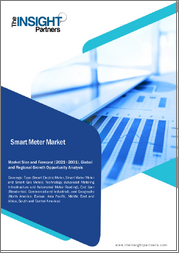
2024년 스마트 미터 시장 규모는 492억 4,000만 달러로, 2031년에는 262억 1,000만 달러에 달할 것으로 예측됩니다. 또 2025-2031년에 9.8%의 CAGR을 기록할 것으로 예상되고 있습니다.
미국은 연방정부의 강력한 지원, 전력회사 주도의 송전망 현대화 프로그램, 적극적인 주정부 차원의 정책에 힘입어 스마트미터 도입의 세계 선두주자로 부상하고 있습니다. 이러한 보급은 에너지 효율을 높이고, 송전망의 신뢰성을 향상시키며, 보다 신속한 에너지 관리를 가능하게 하려는 국가적 노력을 반영하고 있습니다. 2024년 8월, Iberdrola는 미국 자회사 Avangrid를 통해 뉴욕주의 전력 및 가스 고객을 위해 70만개 이상의 스마트 미터를 도입함으로써 뉴욕주의 에너지 인프라를 현대화하고 에너지 전환을 지원하는 역할을 추진하고 있습니다. 이를 통해 보다 정확한 실시간 소비 데이터를 얻을 수 있으며, 추정 검침에서 벗어나 송전망의 효율성을 향상시킬 수 있습니다. New York State Electric & Gas(NYSEG) 및 Rochester Gas and Electric(RG&E) 고객에 설치된 스마트 미터는 전력 회사와의 무선통신을 용이하게 하고, 정전 감지 및 대응 능력을 향상시키며, 지속가능한 에너지 개발에 대한 지속가능한 에너지 개발에 대한 Iberdrola의 광범위한 약속과 일치합니다.
2023년 1월, 독일 정부는 에너지 전환의 디지털화를 활성화하고 스마트 미터의 전국적인 보급을 촉진하기 위한 법안을 승인했습니다. 2023년 봄부터 시행되는 이 법에 따라 대규모 스마트미터의 즉각적인 도입이 용이해지고, 2025년부터는 강제 도입이 시작됩니다. 또한 2030년까지 거의 완전한 보급을 목표로 법적 구속력이 있는 마일스톤을 통한 명확한 로드맵을 제시하고 있습니다. 이 새로운 법은 스마트 미터의 보급을 크게 가속화하고 현대 에너지 시스템에 필수적인 디지털 인프라를 강화하는 것을 목표로 하고 있습니다. 스마트 미터는 변동하는 에너지 수요와 간헐적인 재생에너지 발전을 효율적으로 관리하기 위해 필요한 디지털 백본을 제공하고, 저배출 에너지의 미래를 실현하는 중요한 수단입니다. 또한 2022년에는 이탈리아가 스마트미터 도입 시장 선두주자로 부상하여 연내 260만 대를 설치했습니다. 2024년 5월 현재 이탈리아는 1세대 스마트미터 보급을 성공적으로 완료하여 설치 대수가 3,620만 대에 달할 전망입니다. 2세대 보급도 상당히 진척되어 3,020만 대가 도입되어 82%가 완료된 상태입니다. 이는 첨단 계측 기술을 통해 에너지 인프라를 현대화하려는 이탈리아의 강력한 의지를 반영합니다.
스마트 미터 시장에 참여하고 있는 주요 기업은 J Landis+Gyr, Schneider Electric, Itron, Inc., Xylem(Sensus), Sagemcom, Hubbell, ZENNER International GmbH &Co.KG, Honeywell International, BOVE Technology, Siemens AG 등이 있습니다. 이들 업체들은 혁신적인 제품을 저렴한 가격에 제공함으로써 많은 소비자를 끌어들이고 있습니다.
전체 스마트미터 시장 규모는 1차 정보와 2차 정보를 모두 사용하여 산출됩니다. 시장 관련 질적, 양적 정보를 얻기 위해 사내외의 다양한 정보원을 통해 철저한 2차 조사를 실시했습니다. 또한 데이터를 검증하고 주제에 대한 분석적 인사이트를 얻기 위해 업계 관계자를 대상으로 여러 차례의 1차 인터뷰를 진행했습니다. 이 과정에 참여하는 기업에는 부사장, 시장 개발 매니저, 시장 인텔리전스 매니저, 국내 영업 매니저 등 업계 전문가와 스마트미터 시장을 전문으로 하는 평가 전문가, 리서치 애널리스트, 키 오피니언 리더 등 외부 컨설턴트들이 포함됩니다.
The Smart meter market size was valued at US$ 49.24 billion in 2024 and is projected to reach US$ 26.21 billion by 2031; it is expected to register a CAGR of 9.8% from 2025 to 2031.
The US has emerged as a global frontrunner in smart meter deployment, propelled by strong federal backing, utility-driven grid modernization programs, and proactive state-level policies. This widespread adoption reflects a national commitment to enhancing energy efficiency, improving grid reliability, and enabling more responsive energy management. In August 2024, Iberdrola, through its US subsidiary Avangrid, is advancing its role in modernizing the country's energy infrastructure and supporting the energy transition by deploying over 700,000 smart meters for electricity and gas customers in New York State. This initiative enables more accurate, real-time consumption data, moving away from estimated readings and enhancing grid efficiency. The smart meters-installed for customers of New York State Electric & Gas (NYSEG) and Rochester Gas and Electric (RG&E)-facilitate wireless communication with utilities, improving outage detection and response capabilities and aligning with Iberdrola's broader commitment to sustainable energy development.
In January 2023, the German government approved a draft of legislation aimed at revitalizing the digitalization of the energy transition and expediting the nationwide rollout of smart meters. Effective from Spring 2023, the law facilitates the immediate launch of large-scale smart meter deployments, with mandatory implementation beginning in 2025. It also outlines a clear roadmap with legally binding milestones, targeting near-complete adoption by 2030. This new act is designed to significantly accelerate the rollout of smart meters and elevate the digital infrastructure essential for a modern energy system. Smart meters are a critical enabler of a low-emissions energy future, providing the digital backbone needed to manage variable energy demand and intermittent renewable generation effectively. Furthermore, in 2022, Italy emerged as the market leader in smart meter deployment, installing ~2.6 million units within the year. As of May 2024, the country successfully concluded its first-generation smart meter rollout, reaching a total of 36.2 million installed devices. Progress on the second-generation rollout has also been substantial, with 30.2 million units deployed-representing 82% completion. This reflects Italy's strong commitment to modernizing its energy infrastructure through advanced metering technology.
Some of the key players operating in the Smart meter market are J Landis+Gyr; Schneider Electric; Itron, Inc.; Xylem (Sensus); Sagemcom; Hubbell; ZENNER International GmbH & Co. KG; Honeywell International; BOVE Technology; and Siemens AG. These players offer innovative products at affordable prices that attract a large number of consumers, opening new opportunities for them in the coming years.
The overall Smart meter market size has been derived using both primary and secondary sources. To begin the research process, exhaustive secondary research has been conducted using internal and external sources to obtain qualitative and quantitative information about the market. Also, multiple primary interviews have been conducted with industry participants to validate the data and gain analytical insights into the topic. Participants in this process include industry experts, such as VPs, business development managers, market intelligence managers, and national sales managers, along with external consultants, such as valuation experts, research analysts, and key opinion leaders, specializing in the Smart meter market.